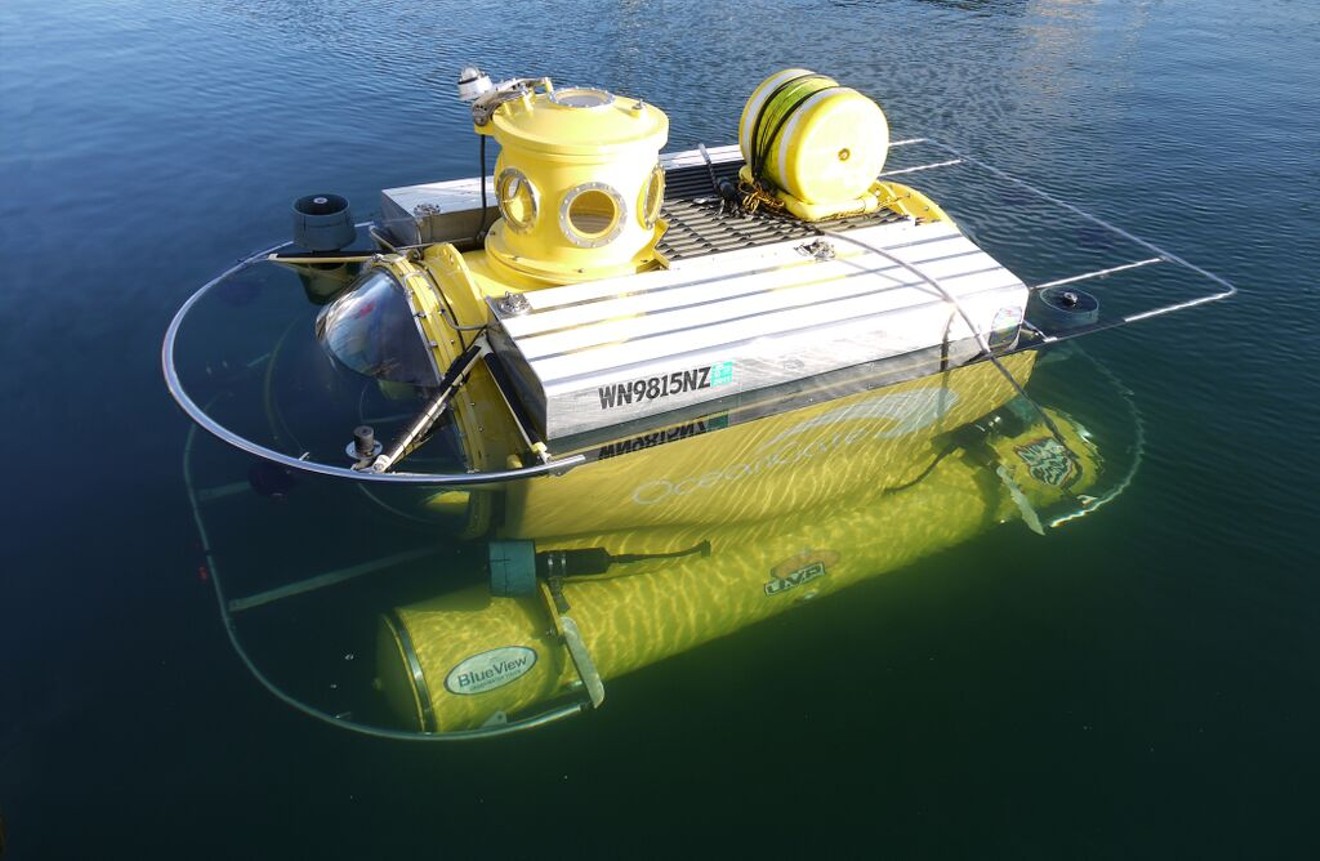The three-day event from June 27 through June 29, 2013, dubbed "Expedition Lionfish," included two days of dives off the coast of South Florida and panel discussions to "halt the unprecedented expansion of this invasive species." The project was hosted by Nova Southeastern University's Oceanographic Center in Hollywood.
Researchers who worked with Rush on the trip never would have imagined that he and OceanGate would one day be at the center of a tragedy that drew a global spotlight and called into question Rush's safety protocols. They say Rush appeared dedicated to the South Florida mission, and there was no inkling of looming safety issues with the company.
"Ten years ago, we knew relatively little about what lionfish were doing below those diveable depths, and so being able to use that submersible was a real opportunity to see what was happening," Stephanie Green, an associate ecology professor and research chair at the University of Alberta, tells New Times.
On June 18, OceanGate's 22-foot carbon fiber and titanium submersible, Titan, went missing with five people aboard, including Rush, during its descent to the Titanic shipwreck site. The sub lost contact with its surface ship, the Canadian vessel Polar Prince, nearly two hours into the dive.
A massive search ensued for the missing submersible, which had limited oxygen remaining for its five occupants: Rush, Hamish Harding, Paul-Henri Nargeolet, Shahzada Dawood, and Suleman Dawood. Following the submersible's disappearance, emails surfaced in which a former OceanGate adviser warned Rush in 2018 that the Titan vessel could fail in a high-pressure environment.
When Steve Gittings, a scientist who'd been on the 2013 Antipodes expedition, found out that a submersible had disappeared near the Titanic, his mind immediately jumped to OceanGate and Rush, as it was the only company he knew that offered that excursion.
"Man, I got sicker and sicker when I started wondering what was going on," says Gittings, chief scientist of marine sanctuaries at the National Oceanic and Atmospheric Administration. "In my head, collapse didn't even come into my mind because I'd never heard anybody suspect that carbon fiber might have weaknesses. What crossed my mind is it's sitting on the bottom out of power because I've been a sub pilot — I've piloted a one-man sub. I know the kinds of things that can happen that can leave you sitting on the bottom without too many options for getting up."
Gittings clung to hope until the U.S. Coast Guard announced last month that Titan had suffered a "catastrophic implosion" that killed everyone on board. He says he was shocked and despondent when he learned of the passengers' fate.
The scientist adds that the tragedy is a major setback for the already-underfunded submersible industry.
"I hate that people like [Rush] have to be the ones to experiment with these products alone on their own, and people think they're out there mavericking along," Gittings says.
"No Strange Noises"
Gittings tells New Times OceanGate's expedition in 2013 helped shed light on the habitats that invasive lionfish favored in South Florida waters. "I wanted to go out and look at what kind of structures lionfish like, and if I could mimic that structure, then the lionfish would be attracted to it, and we scoop them up with a trap," Gittings says.
First spotted in Florida waters in the 1980s, lionfish are a spiny, venomous predatory species that interfere with Florida's coral reef ecosystems thanks to their large appetite and lack of natural predators. Ecologists believe the fish, native to the South Pacific and Indian Oceans, were introduced to the South Florida region after some were released from a marine aquarium.
Gittings describes Antipodes as a "typical" sub for its class. He claims everything seemed fine inside the steel sphere while on the dive.
"There were no strange noises," he tells New Times. "Nothing unusual at all, and it operated the same way I've done in probably six or seven other subs I've been in over the course of my career."
Rush was an aerospace engineer who graduated from Princeton University before working for airplane manufacturer and military defense contractor McDonnell Douglas. In 2009, he cofounded OceanGate, which acquired the Antipodes submersible and built two more: Titan and Cyclops 1.
OceanGate began offering dives to the Titanic wreckage site in international waters for $250,000 — many of which were reportedly unsuccessful.
Whereas the Titan could reportedly reach 12,500 feet in the Atlantic Ocean, the researchers on the Antipodes hovered around 300 to 500 feet below the surface.
"I found that the operation was really well run from my perspective," Green says. "It was a series of dives where we're in sight of the coast of Florida. You're certainly deeper than any recreational scuba diver would go but still quite shallow, relatively speaking."
She adds the dive showed how grave the lionfish problem had become in reefs in South Florida.
"I remember on my dive, we were approaching the shipwreck called the Billy Boyd and just seeing lionfish covering the stern of the ship and on the deck through the windows of the sub," Green says.
After he noticed on the dive that lionfish were attracted to manmade objects and artificial reefs, Gittings returned home and was able to put together a trap to help capture the invasive species. He says the trip was very "encouraging."
While, in the wake of the Titan tragedy, reports emerged that the OceanGate CEO allegedly cut corners and dismissed safety concerns over his trips to the Titanic wreckage, Gittings recalls feeling safe and secure when he dove with the now-deceased submersible enthusiast. He says he enjoyed working with Rush and appreciated his "philosophy to hire young engineers to give them valuable experience."
"I don't know how much he depended on them for Titan when it came around or not, but he did have a group of young engineers that were really energetic and really smart [in 2013]," Gittings says. "I liked that he wanted to help young engineers out."
Submersible Future
Green says regulation of submersible operations in international waters and more industry funding are necessary to ensure attempts at innovation in underwater exploration can move forward safely. She says combining reasonable safety regulations with financing for conservation- and discovery-based missions will help the submersible industry stay alive. "I think that scientific missions that have well-funded support and the buy-in of governments and research agencies are critical, and there is a role for a commercial industry to play," Green tells New Times.
"I hope that if there's anything that can be learned, it's just to make this a safer industry in terms of continuing to explore those spaces, which is so important," Green says.
Gittings tells New Times that without outside funding, submersible enthusiasts like Rush can wind up pushing the limits of their financial and technological capacity with tragic results. He notes there is "not a lot of government investment in submersible technology like there is in outer space technology."
In a set of 2018 emails, Rush allegedly sparred with consultant Rob McCallum after McCallum warned him about using a "prototype un-classed technology in a very hostile place," referring to the Titan.
"As much as I appreciate entrepreneurship and innovation, you are putting an entire industry at risk," McCallum wrote.
Rush responded that he was adhering to an "engineering focused, innovative approach," as opposed to a "compliance-focused design process."
"I have grown tired of industry players who try to use a safety argument to stop innovation and new entrants from entering their small existing market... We have heard the baseless cries of 'you are going to kill someone' way too often. I take this as a personal insult," Rush allegedly responded.
As for Antipodes, OceanGate tried to sell it long before the tragedy, but it languished on the market for five years, according to yacht broker Steve Reoch. He told Insider that he doubts the vessel will find a buyer after the Titan tragedy — and that it will "likely be tied up in litigation for years."









